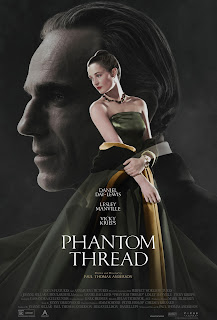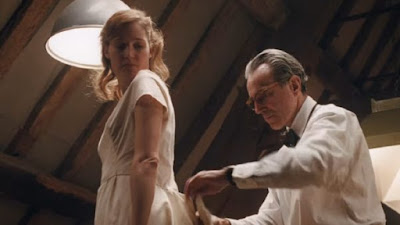To the End of the World
or
"How Was Your War?" "Too Long. How Was Yours?"
It starts out very quietly before we see anything. The sounds of Nature. The slightest of breaths.
A knight rides through the woods on horse-back, a little girl waiting for him.
It is the last thoughts of Vivienne Le Coudy (Vicky Krieps, she of Phantom Thread), French-Canadian florist/bartender/mother/cook/carpenter/pioneer-woman. She is tended to, watched over, then mourned by her common-law husband Holger Olsen (Viggo Mortensen), Danish carpenter/soldier/sheriff.
Vivienne is dead. And the man Olsen wants to kill, Weston Jeffries (Solly McLeod) has just killed five people at the local saloon, as well as the deputy sheriff of the town. He's the son of a local rancher, Alfred Jeffries (Garret Dillahunt) and just no damn good. The mayor, Rudolph Schiller (Danny Huston, in a performance slightly reminiscent of his father), who has business dealings with the man can't have such a massacre go unpunished, so he informs Olsen, who is in the process of burying his wife, of what happened, and assures the sheriff that they have the man who did it. A rather dim employee of the rancher volunteers to take the rap, never realizing that he might be hanged to save the son's neck. Olsen turns in his badge in protest. He has work to do.
Being Sheriff will just get in the way.
Sounds like a "typical" Western, doesn't it? But The Dead Don't Hurt, written/directed/starring Viggo Mortenson*, is only familiar in outline form and goes about things quite a bit differently. Mortenson strips away the rituals of Westerns, the shoot-outs, the robberies, the culture clashes with Natives, the chases (other than a brief one), the courtliness between men and women, and shows us the bare-bones and foundations of building a life in the wilderness, where people by necessity are "gig-workers" making use of whatever talents they have to scrape a living out of the dirt. You have to be tough, resilient, and oh-so-patient to eke out an existence, using Nature but fighting it back lest it overcome you.
Mortenson's characters have depth. They seem to have lives off-screen when we don't see them, histories and, hopefully, futures. More is spoken across someone's face than from their lips. And as there is not one Native in the entire movie, it drives home the point that the country was re-tooled under the auspices of immigrants, bringing their pasts with them. The film even feels like a "foreign" film, concentrating on the small moments, lingering on the consequential ones, and the violent ones are over in the time it takes to stop a heart.There is another aspect to it that I like and always have been fond of—it's non-linear, starting with the death of one character and telling her story in flash-back, but not in an obvious, telegraphed way. The only way you can make the realization that a jump has happened is in paying attention to Olsen's facial hair, starting out with a brushy moustache, and his later, post-Civil War scenes, with a full beard, thus relieving any distracting questions ("Gee, what did he do with the kid?") that will pull you out of the movie—as I sometimes experienced. There are no exclamatory time-stamps holding your hand and making things obvious, but merely relying on the images on-screen to tell the story, the details of which orient you in situ.I like that. And it allows Mortenson to juggle the story-line in a dramatic way to allow the story to evolve and not be fronted solely by a love story and back-ended by a revenge plot. Time stretches, evolves, and we learn more in this structure than by a simplistic start-middle-end timeline. Things seem to matter more. The character of Vivienne seems to matter more, as she is the center around which the movie revolves.
And in this structure, the film feels more like a memory, a totem of the woman we see dying in the beginning. Despite her early demise in the film, we see her life unfold in the flashbacks, the decisions she makes, the things she endures. It's really her film and the character haunts it—like we're seeing it play out in the moment of her death. And the performance of Krieps is a wonder to behold, played out with restraint, choosing her battles, internalized, not being dramatic about it. Enduring. It's a cliché to say that it's an award-winning performance—it has to be recognized first, and to do that, people have to see it, and I doubt the movie will get the attention it deserves to garner her such acclaim.Which is a pity. This is already one of my favorite movies of the year (it clicks so many of my "this-makes-a-good-movie" boxes, which run counter to the adrenaline-fueled roller-coasters that drive the weekend box office figures), and I wish people will go out to theaters to see it. It's a big screen movie—especially with the sound—and it will lose a lot on a small video screen, and—god forbid!—on a telephone. It's an appointment movie, where time needs to stop to appreciate it and take it in. But, we live in a different time and a different sensibility than the one portrayed.More's the pity. But, the mysteries of The Dead Don't Hurt are still percolating through my mind, and it may take another visit to fully appreciate just how good it is.
And in this structure, the film feels more like a memory, a totem of the woman we see dying in the beginning. Despite her early demise in the film, we see her life unfold in the flashbacks, the decisions she makes, the things she endures. It's really her film and the character haunts it—like we're seeing it play out in the moment of her death. And the performance of Krieps is a wonder to behold, played out with restraint, choosing her battles, internalized, not being dramatic about it. Enduring. It's a cliché to say that it's an award-winning performance—it has to be recognized first, and to do that, people have to see it, and I doubt the movie will get the attention it deserves to garner her such acclaim.Which is a pity. This is already one of my favorite movies of the year (it clicks so many of my "this-makes-a-good-movie" boxes, which run counter to the adrenaline-fueled roller-coasters that drive the weekend box office figures), and I wish people will go out to theaters to see it. It's a big screen movie—especially with the sound—and it will lose a lot on a small video screen, and—god forbid!—on a telephone. It's an appointment movie, where time needs to stop to appreciate it and take it in. But, we live in a different time and a different sensibility than the one portrayed.More's the pity. But, the mysteries of The Dead Don't Hurt are still percolating through my mind, and it may take another visit to fully appreciate just how good it is.





















